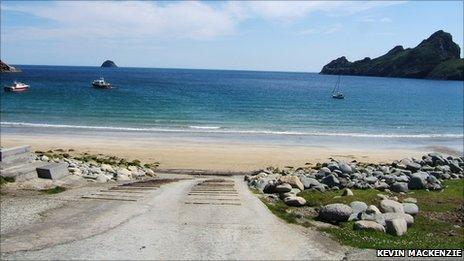Climate change 'a main threat' to St Kilda
- Published

Warming sea temperatures have also been highlighted as a risk to marine life
Climate change and coastal erosion pose the biggest threats to archaeological sites on the remote archipelago of St Kilda, its owners have said.
The National Trust for Scotland (NTS) said abandoned buildings, including the feather store on the main island of Hirta, are at risk.
Warming sea temperatures also threaten marine life, such as plankton, on and around its sea cliffs.
The risks have been identified in a draft management plan for the islands.
Other historic structures under threat are cleits, small stores built of stone with a turf roof and often used to hold cut peat.
Radar station
NTS said the Ministry of Defence's (MoD) presence on Hirta was key to protecting St Kilda from vandalism.
The MoD has a radar station on the island which is staffed all year.
In the draft plan, NTS said: "Climatic conditions and coastal erosion remain the main threat to the abandoned houses, cleits and other archaeological remains across the archipelago."
It adds: "Probably the most severe threat to the integrity of the marine environment comes from the variations in the marine ecosystem, especially plankton, caused by climate change."
NTS has sought public feedback on the draft plan.
- Published15 November 2010
- Published29 August 2010